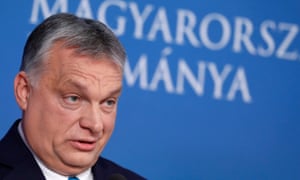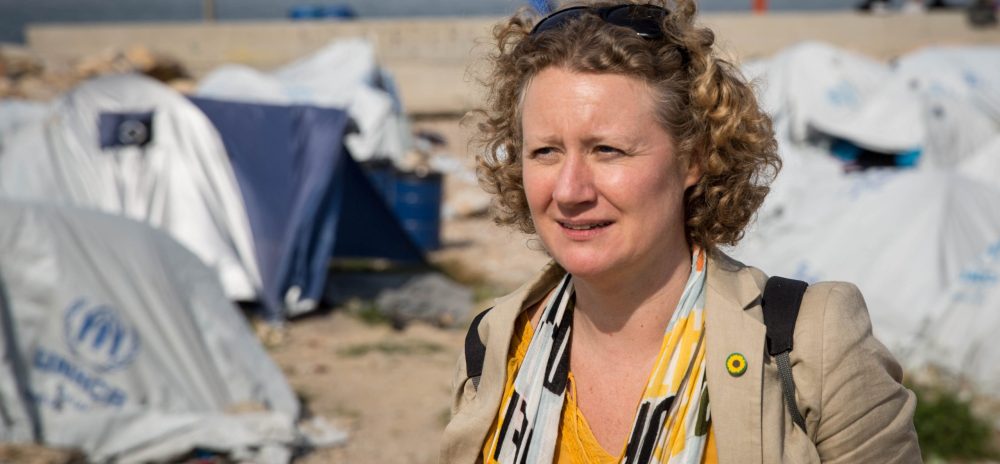The Guardian, 30 January 2019, Jennifer Rankin in Brussels
Judith Sargentini of Dutch Greens says situation has got worse since her report last year

The Hungarian prime minister, Viktor Orbán, has dismissed criticism by EU leaders. Photograph: Bernadett Szabó/Reuters
European Union leaders are failing to act despite the “worsening” outlook for the rule of law in Hungary, according to a leading MEP.
Judith Sargentini, a Dutch MEP whose report triggered the EU’s most serious disciplinary procedure against Hungary last September, called on the Council of EU member states to start “a real process” that would examine the rule of law in that country.
“Since the vote on my report in September things in Hungary actually only got worse,” said the Green MEP.
Since MEPs voted to trigger action from EU member states, she said the Central European University had moved to Vienna and the government had created a new court that will be subject to ministerial control.
She also listed the decision to award refugee status to a former Macedonian prime minister convicted of corruption, the “slave law” on overtime, which has brought Hungarians on to the streets, as well as the merger of 450 media outlets without authorities being able to make usual checks.
The MEP called on Romania, which is chairing the EU rotating presidency, to produce a timetable for examining the rule of law in Hungary, as she accused Budapest of stalling the process. “Hungarian citizens have the right for protection and have the right to know what you are planning to do.”
Frans Timmermans, the vice-president of the European commission, said he regretted that Sargentini had not been given a chance to present her analysis of threats to the rule of law in Hungary to EU ministers.
The European parliament voted to trigger the EU’s most serious disciplinary procedure against Hungary last September, a move that was supported by some MEPs in the centre-right European People’s party, the group that houses the ruling Fidesz party.
Although EU law requires member states to act, the procedure has languished and little progress is expected before European elections in May.
Hungary’s government refused to take part in the latest debate in Brussels, saying that the European institutions had been hijacked by “the political left and political liberals” for a political rally. Viktor Orbán’s spokesman, Zoltán Kovács, claimed that the rule of law procedure was a “political plot” linked to the philanthropist George Soros, the Hungarian-born billionaire philanthropist who is subject to relentless attack by the Hungarian government.
The government also singled out Timmermans, describing the Dutch EU commissioner as “an arm of these leftist liberal Soros-related organisations”.
Timmermans, who is seeking to become the next commission president, rejected attempts to portray him as pursuing his own agenda. “In my work on the rule of law I have the full support of the president of the commission and all of the other members,” he told journalists. “I would be more worried if Viktor Orbán started praising me frankly,” in remarks that highlight the depth of tensions between Brussels and Budapest.
During the debate on Wednesday evening Hungary’s government received support from conservative MPs, including members of the group created by David Cameron, once he took the Tories out of the moderate centre-right European People’s party. One Polish MEP, who sits with the British Conservatives, said the “European establishment” had been attacking “people you want to get rid of” ever since the moves to isolate the far-right Austrian leader Jörg Haider.
Responding to such points, Timmermans said democracy was always invoked as justification for not complying with EU legislation. Hungary had made the “wonderful” and “sovereign choice” to become a member of the EU. “If you choose to become member of a treaty-based organisation, like the European Union, you by that choice say you will follow the rules of that treaty.”
The debate came one day after new research from Transparency International showed that Hungary was deemed to have become more corrupt since Orbán returned to office in 2010. According to Transparency international’s latest corruption perceptions index, Hungary has fallen nine points in the rankings since 2012 to a level that suggests “serious problems with corruption”.
Kovács dismissed suggestions that Hungary had questions to answer about alleged misuse of EU funds by Orbán’s friends and families. Kovács said it was “a very nice political agenda” for critics, but insisted Hungary obeyed all EU rules.
